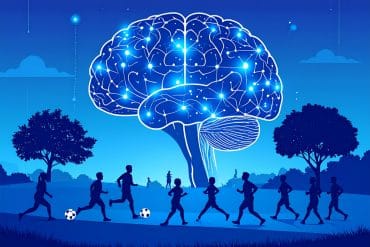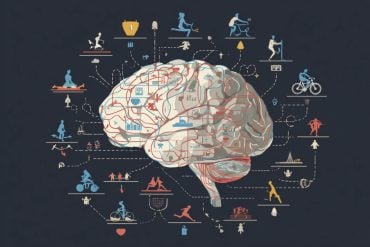Summary: Probiotics can support the effects of antidepressants to help relieve symptoms of depression.
Source: University of Basel
Intestinal flora plays an important role in health – including mental health. Researchers from the University of Basel and the University Psychiatric Clinics Basel (UPK) have shown that probiotics can support the effect of antidepressants and help to alleviate depression.
When he was visited by what he called “the black dog”, Winston Churchill could barely get out of bed. He had no energy, no interests and no appetite. Although the British prime minister didn’t invent this metaphor for depression, he was the one who popularized it.
Experts use medication and psychotherapy to try to help patients escape from the “black dog”, but it persists in some individuals. Researchers are therefore searching for ways to improve existing therapies and develop new ones.
One promising approach is the microbiome-gut-brain axis. The microbiome is generally understood to mean all the microorganisms that live in or on the human body, such as the intestinal flora. Intestinal bacteria can influence the nervous system for instance via metabolic products.
In a recent study, a research team from the University of Basel and the University Psychiatric Clinics Basel (UPK) has shown that probiotics can support treatment with antidepressants.
They have reported their findings in the journal Translational Psychiatry.
Intestinal flora influences the psyche
It is known from previous studies that patients with depression show an above-average prevalence of intestinal and digestive problems. If the intestinal flora of people with depression is implanted in mice raised in sterile conditions – that is, with no intestinal flora – then the animals also develop depressive-like behavior. For example, they are less energetic and show decreased interest in their surroundings than their peers.
Researchers, therefore, suspect that the composition of the bacterial community in the gut plays an important role in depressive symptoms.
In their new study, the researchers led by Dr. André Schmidt and Professor Undine Lang systematically investigated the effects of probiotics on patients with depression.
All participants were inpatients at the University Psychiatric Clinics Basel (UPK) and were given a probiotic (21 subjects) or a placebo (26 subjects) for 31 days, in addition to antidepressants. Neither the participants nor the study staff knew which preparation the subjects were taking throughout the study period.
The researchers carried out a series of tests on the participants immediately before treatment, at the end of the 31 days and again four weeks later.
The subsequent analysis showed that although depressive symptoms decreased in all participants thanks to the general antidepressant treatment, there was a greater improvement in the subjects in the probiotic group than in the placebo group.
In addition, the composition of their intestinal flora changed, at least temporarily: in the probiotic group, an analysis of stool samples revealed an increase in lactic acid bacteria at the end of treatment – an effect that was accompanied by a reduction in depressive symptoms.
However, the level of these health-promoting gut bacteria decreased again over the following four weeks.
“It may be that four weeks of treatment is not long enough and that it takes longer for the new composition of the intestinal flora to stabilize,” explains Anna-Chiara Schaub, one of the lead authors of the study.
Change in the processing of emotional stimuli
Another interesting effect of taking probiotics was seen in relation to brain activity when viewing neutral or fearful faces.

The researchers investigated this effect using functional magnetic resonance imaging (fMRI). In patients with depression, certain brain regions for emotional processing behave differently than in individuals with good mental health.
After four weeks of probiotics, this brain activity normalized in the probiotic group but not in the placebo group.
“Although the microbiome-gut-brain axis has been the subject of research for a number of years, the exact mechanisms are yet to be fully clarified,” says Schaub.
This was another reason why the researchers believed it was important to use a wide range of bacteria in the form of probiotics, such as formulations already available on the market.
“With additional knowledge of the specific effect of certain bacteria, it may be possible to optimize the selection of bacteria and to use the best mix in order to support treatment for depression,” says the researcher – although she is keen to emphasize that probiotics are not suitable as a sole treatment for depression.
About this depression and gut bacteria research news
Author: Angelika Jacobs
Source: University of Basel
Contact: Angelika Jacobs – University of Basel
Image: The image is in the public domain
Original Research: Open access.
“Clinical, gut microbial and neural effects of a probiotic add-on therapy in depressed patients: A randomized controlled trial” by Anna-Chiara Schaub et al. Translational Psychiatry
Abstract
Clinical, gut microbial and neural effects of a probiotic add-on therapy in depressed patients: A randomized controlled trial
A promising new treatment approach for major depressive disorder (MDD) targets the microbiota-gut-brain (MGB) axis, which is linked to physiological and behavioral functions affected in MDD.
This is the first randomized controlled trial to determine whether short-term, high-dose probiotic supplementation reduces depressive symptoms along with gut microbial and neural changes in depressed patients.
Patients with current depressive episodes took either a multi-strain probiotic supplement or placebo over 31 days additionally to treatment-as-usual. Assessments took place before, immediately after and again four weeks after the intervention. The Hamilton Depression Rating Sale (HAM-D) was assessed as primary outcome.
Quantitative microbiome profiling and neuroimaging was used to detect changes along the MGB axis. In the sample that completed the intervention (probiotics N = 21, placebo N = 26), HAM-D scores decreased over time and interactions between time and group indicated a stronger decrease in the probiotics relative to the placebo group.
Probiotics maintained microbial diversity and increased the abundance of the genus Lactobacillus, indicating the effectivity of the probiotics to increase specific taxa.
The increase of the Lactobacillus was associated with decreased depressive symptoms in the probiotics group.
Finally, putamen activation in response to neutral faces was significantly decreased after the probiotic intervention.
Our data imply that an add-on probiotic treatment ameliorates depressive symptoms (HAM-D) along with changes in the gut microbiota and brain, which highlights the role of the MGB axis in MDD and emphasizes the potential of microbiota-related treatment approaches as accessible, pragmatic, and non-stigmatizing therapies in MDD.
Trial Registration: www.clinicaltrials.gov, identifier: NCT02957591.






